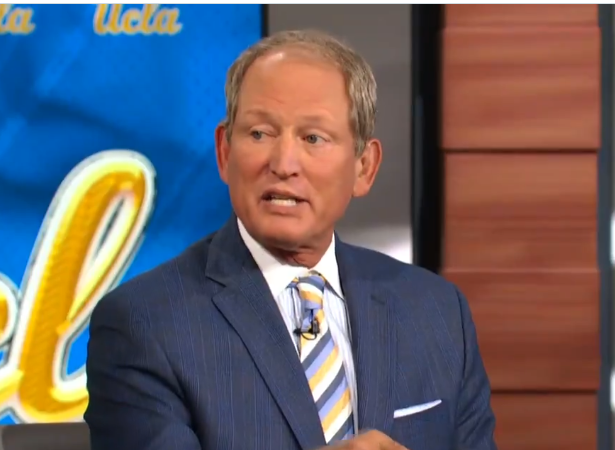In recent days, Jerry Neuheisel’s coaching debut as UCLA’s interim offensive coordinator generated an emotional reaction that reached far beyond the locker room. During his live on-air commentary, his father, Rick Neuheisel, a former UCLA head coach and current CBS pundit, was on the verge of tears. He said, clearly suppressing his emotions, “Don’t make me cry.” Decades of football experience passed down from father to son resulted in a very successful on-field plan that stunned a top-10 opponent, making it more than simply a game.

After Tino Sunseri left, Jerry took over as offensive coordinator, but he wasn’t just entering into a position; he was taking on a legacy with great expectations. Nevertheless, he guided the Bruins to a 42–37 upset victory over No. 7-ranked Penn State with remarkable poise and accuracy. The dynamic and adaptable Bruins attack amassed 435 total yards. The potential of quarterback Nico Iamaleava was made abundantly evident by Jerry’s play-calling. With 294 total yards and five touchdowns, Iamaleava displayed a rhythm that is uncommon while facing such a top defense.
Jerry Neuheisel – Personal and Career Information
| Category | Details |
|---|---|
| Full Name | Jerry Neuheisel |
| Year of Birth | 1992 |
| Age | 33 (as of 2025) |
| Parents | Rick Neuheisel and Susan Neuheisel |
| Siblings | Jack (former SMU wide receiver), Joe (UCLA student) |
| High School | Loyola High School, Los Angeles |
| College | UCLA – Quarterback |
| Current Role | Interim Offensive Coordinator, UCLA Football Team |
| Notable Achievement | Led UCLA offense to victory vs No. 7 Penn State in 2024 |
| Coaching Style | Balanced blend of intuition, game film mastery, and situational flair |
Jerry created a game plan that was aggressive and flexible by utilizing his extensive knowledge of the program and a coaching intuition developed from his time as a UCLA center. He turned a club with mounting skepticism into a cohesive unit that could stretch the field, manage tempo, and play with discipline. The offensive was noticeably better than in prior games, and the outcomes were unavoidable.
Rick’s thoughts during the post-game analysis were brimming with unadulterated parental delight. Whether it’s football or choir, “all of us parents understand,” he added. “When they get a stage and you see them shine, it makes everything worth it.” That message resonated powerfully across fan communities and media opinion alike. Football was only one aspect of this; other aspects were family, continuity, and the benefits of constant preparation.
In light of contemporary coaching trends, Jerry’s ascent offers a welcome diversion from college football’s high turnover and analytics-driven hiring cycles. While statistics and numbers are clearly vital, Jerry’s debut reminded spectators that gut, film study, and locker room chemistry remain tremendously versatile weapons in modern play design. His ability to adapt quickly and give players confidence in the system demonstrated a traditional mindset combined with a contemporary tempo.
As one of three sons, Jerry grew up in a home where football was frequently discussed at the dinner table. After graduating from Loyola High School in Los Angeles, which Jerry and his younger brother Joe also attended, Jack Neuheisel played wide receiver at SMU. Later, Joe followed in his family’s footsteps and enrolled in UCLA, but his academic path diverted attention from football. Nevertheless, the Bruins’ identity is still entwined with the Neuheisel name, spanning roles and generations.
Sports dynasties have changed over the last ten years, both in terms of their strategic leadership and athletic ability. Steve Belichick (son of Bill) and Lane Kiffin (son of Monte) are two examples of how coaching families can generate second-generation thinkers who contribute very creative ideas to their programs. This trend is followed by Jerry’s arrival, yet he stands out for his humility and sense of homegrownness. He is establishing credibility one strategy at a time rather than trying to make headlines.
This development could not have occurred at a more critical time for UCLA. Stability and a feeling of identity were essential during the team’s transitional phase. Jerry delivered both, giving a highly efficient offensive performance that allowed his players to prosper with fresh confidence. He had a clear advantage while managing the demands of game day leadership because of his understanding of team dynamics, which was developed via years of sideline watching and progressive coaching immersion.
Discussions concerning Jerry’s ability as a long-term coordinator have started to emerge since the start of this new offensive era. He might go swiftly from temporary to permanent if outcomes keep going in this direction. Notably, his attitude is particularly effective in rebuilding confidence with players and fans alike, many of whom had grown sick of inconsistency and underachievement in recent seasons.
Jerry is developing a contemporary iteration of the Neuheisel coaching tree by incorporating insights from his father’s long career, which included time spent at Colorado, Washington, UCLA, and in the NFL. Before developing his collegiate coaching resume, Rick played in the NFL and the USFL, but Jerry is paving his own way with emotional intelligence, surgical patience, and a playbook that is both traditional and flexible.
Through deliberate decision-making and effective communication, Jerry Neuheisel has already transformed the notion of UCLA’s offensive potential. His debut served as a reminder that coaching is a craft that is handed down like heirloom tools, honed over time, and tailored to each generation’s needs. It was also strategically sound and significant.
